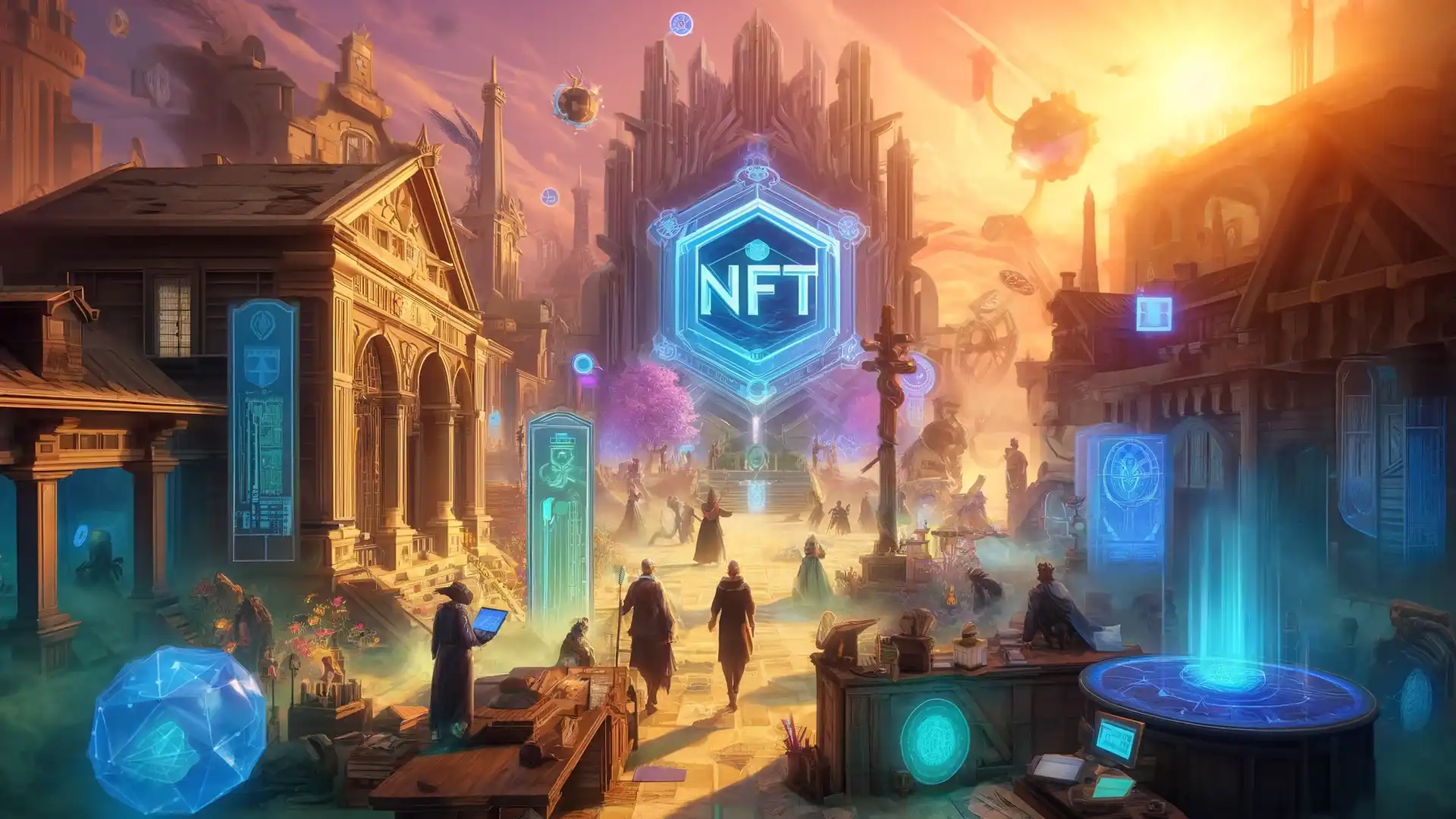Current Trends in Using NFT Credentials in Education

 Author:
Artem Grigoriev
Author:
Artem Grigoriev
The Integration and Advantages of NFT Credentials in Modern Education
Imagine a world where your academic achievements are not just paper certificates. These can be easily lost or forged. Instead, they become unique digital assets securely stored on the blockchain. This digital system records information in a way that makes it difficult to change.
📘 This article complements: "The Complete Guide to NFT Credentials". Explore it to find answers to all your questions;)
Non-fungible tokens (NFTs) are revolutionizing how educational credentials are issued, managed, and verified. NFTs are unique digital items that can represent ownership or proof of authenticity. They are similar to one-of-a-kind collectibles but in digital form. These unique digital assets use blockchain technology to provide a secure, decentralized, and transparent method for handling academic certifications. This represents a groundbreaking shift in modern education .
NFT credentials work by encoding educational achievements onto a blockchain. This ensures that each credential is unique, verifiable, and immutable. The process begins with an educational institution issuing a credential in the form of an NFT. This NFT is then stored on a blockchain. A blockchain functions like a digital ledger that records transactions across many computers, making it impossible to alter the registered transactions afterward.
Students can access and share their NFT credentials easily. This ensures their academic records are secure and accessible anytime, anywhere. According to a study by the World Economic Forum, blockchain technology can greatly enhance the security and integrity of digital credentials World Economic Forum on Blockchain .
One significant advantage of integrating NFT credentials into education is enhanced student mobility . This refers to the ease with which students can move between schools. Imagine being able to transfer your credits seamlessly from one university to another, anywhere in the world. With NFT credentials, this is possible.
Students can share and verify their credentials across institutions globally. This facilitates international education and exchange programs without the usual bureaucratic delays. A report by the European Commission highlights how digital credentials can simplify cross-border educational exchanges and improve recognition of qualifications European Commission on Digital Credentials .
Another key benefit is the cost-effectiveness of certification. Managing and issuing paper-based credentials is not only costly but also time-consuming. NFT credentials streamline this process by reducing administrative overhead and the need for physical storage and distribution. This makes the certification process more affordable and efficient for educational institutions, allowing them to allocate resources more effectively.
Research by EDUCAUSE suggests that adopting blockchain for credentialing can significantly reduce costs associated with credential management EDUCAUSE on Blockchain Cost Efficiency .
💡 Note: NFT credentials stored on the blockchain are universally recognizable and trusted. They eliminate discrepancies and doubts often associated with traditional paper-based certificates.

Moreover, credential fraud is a growing concern in the academic world. With the immutable nature of blockchain, NFT credentials cannot be altered or forged once issued. This ensures the authenticity and integrity of academic records, providing a trustworthy verification process for employers and institutions.
A study by the Journal of Higher Education Policy and Management found that blockchain technology can effectively combat credential fraud, enhancing the trustworthiness of academic qualifications Journal of Higher Education Policy and Management .
Digital identity verification is another critical advantage of NFT credentials. Students can consolidate all their educational achievements into a single, verifiable digital identity. This simplifies the process of sharing and proving qualifications across various platforms and services, enhancing the ease and security of accessing educational and professional opportunities.
Case studies highlight the practical benefits of NFT credentials. For instance, the Massachusetts Institute of Technology (MIT) and the University of Nicosia are pioneers in using blockchain technology to issue digital diplomas. These institutions have demonstrated the effectiveness and potential of NFT credentials, enhancing the credibility and accessibility of academic achievements MIT Blockchain Initiative .
Furthermore, the role of blockchain technology, smart contracts, and decentralized learning platforms in facilitating NFT credentials cannot be overstated. Blockchain ensures the security and transparency of the credentials. Smart contracts automate the issuance and verification processes. Decentralized learning platforms provide a robust infrastructure for distributing and managing NFT credentials, making the entire system more efficient and reliable.
Additionally, these technologies collectively work towards creating an ecosystem where educational data is seamlessly integrated and utilized. This fosters innovation and collaboration in the educational sector.
In summary, NFT credentials represent a significant advancement in educational technology. They offer a secure, efficient, and globally recognized method for managing academic certifications. By addressing existing challenges in the educational landscape, NFT credentials pave the way for a more connected and trustworthy global education system. They benefit students, educators, and institutions alike.
This shift not only modernizes credentialing but also aligns with broader digital transformation trends in education . This ensures the sector remains resilient and adaptive in a rapidly evolving world.
💡 Tip: When considering the adoption of NFT credentials, educational institutions should evaluate the technological and security benefits . They should also consider the readiness of legal systems and potential regulatory changes needed to accommodate digital credentials. Partnering with tech companies specializing in blockchain solutions ensures smooth implementation and management of NFT credentials.

Addressing Challenges and Future Prospects of NFT Credentials in Education
As revolutionary as NFT credentials are, their integration into education comes with significant challenges. One of the foremost concerns is security and privacy . NFT credentials, stored on blockchain, are susceptible to hacking and unauthorized access. This necessitates robust, advanced security measures to protect sensitive student data.
Educational institutions must maintain the integrity of academic records. They do this by implementing and continually updating sophisticated security protocols to counter emerging threats. According to a report by the National Institute of Standards and Technology (NIST), adopting comprehensive blockchain security frameworks is essential for safeguarding digital credentials. For more details, refer to the NIST on Blockchain Security . In simpler terms, schools need to use strong, advanced methods to keep student information safe from hackers.
Additionally, the technological requirements for adopting NFT credentials are substantial. Schools and universities need to invest in sophisticated IT infrastructure. Both faculty and students require adequate training to navigate these new systems effectively. The initial investment in technology and training can be high. Over time, the benefits—such as streamlined administrative processes and reduced fraud—can offset these costs.
The EDUCAUSE 2021 Horizon Report highlights the need for technological readiness and institutional support in adopting blockchain technologies in education. More information can be found in the EDUCAUSE Horizon Report . This means that while it may be expensive at first to get the necessary technology and train people, the long-term savings and benefits can make it worthwhile.
A comparative analysis reveals both strengths and weaknesses of NFT and traditional credentials. Traditional credentials are familiar, widely accepted, and straightforward. They often lack the flexibility and security provided by NFTs. Traditional credentials are the paper certificates we're used to. They are simple but can be lost or faked.
On the other hand, NFT credentials offer real-time updates and easy verification. However, their adoption is hindered by unfamiliarity and technical challenges. NFTs can be updated and checked quickly but might be confusing and difficult to use at first. A balanced approach, combining the reliability of traditional methods with the innovative benefits of NFTs, may be the most effective solution. This hybrid approach can provide a smoother transition and broader acceptance among educational stakeholders.
The chapter also discusses the regulatory and ethical considerations surrounding NFT credentials. Legal implications include compliance with data protection laws. Institutions need to create secure and ethical frameworks for NFT use. Additionally, it's essential to address issues of accessibility and equity. This ensures that the adoption of new technologies does not exacerbate existing educational disparities. This means making sure everyone has fair access to the new technology. It also means it doesn't create new inequalities.
💡 Note: Compliance with data protection regulations like GDPR and FERPA is crucial when adopting NFT credentials. Educational institutions must develop frameworks that ensure the secure and ethical use of these digital assets. The European Union Agency for Cybersecurity (ENISA) provides guidelines on maintaining compliance with GDPR while implementing blockchain solutions. For detailed guidelines, visit ENISA on GDPR and Blockchain . This means schools need to follow strict rules to protect student information and use NFTs responsibly.

The International Association of Privacy Professionals (IAPP) emphasizes the importance of balancing innovation with privacy and equity in educational technologies. You can read more on this topic in the IAPP on Privacy and Educational Tech .
Looking forward, the future prospects of NFT credentials are promising. Emerging trends suggest greater customization of learning paths. This allows students to earn and display micro-credentials for specific skills and achievements in real-time. This personalization fosters a more engaging learning experience. It encourages continuous professional development and lifelong learning.
The World Economic Forum predicts that personalized education through blockchain and NFTs will become more prevalent. This enhances both learning outcomes and employability. For more insights, refer to the World Economic Forum on Personalized Learning .
Implementing NFT credentials in educational institutions involves several practical steps :
- Start with pilot programs
- Engage stakeholders in the design and deployment phases
- Establish clear guidelines and support systems
- Address common misconceptions, such as concerns over the permanence and complexity of NFT credentials, by providing clear explanations
- Showcase real-world examples of successful implementations
This approach helps in building trust and understanding among all parties involved.
Strategies to enhance student motivation and engagement through NFT credentials are also explored. Customizable learning paths and real-time updates can create a more dynamic and interactive educational environment. By making learning achievements visible and verifiable instantly, students are more likely to stay motivated and engaged. This not only benefits students but also provides educators with valuable insights into student progress. It also highlights areas needing improvement.
In conclusion, while NFT credentials present certain challenges, they also offer significant opportunities for enhancing the educational landscape. By addressing security and privacy concerns and meeting technological requirements, educational institutions can leverage the benefits of NFT credentials. This creates a more secure, efficient, and engaging system for managing academic certifications. This chapter provides a comprehensive guide to navigating these challenges. It also shows how to harness the future potential of NFT credentials in education.
💡 Tip: When planning the implementation of NFT credentials, consider conducting pilot programs and actively involving stakeholders. This ensures a smooth transition and addresses any challenges early on. This proactive approach can facilitate a more seamless adoption process and help in fine-tuning the system based on feedback.

The Role of Smart Contracts in NFT Credentials: Their Importance Explained
NFT Credentials: Revolutionizing Online and Distance Learning
The Environmental Impact of NFT Credentials
Building Communities and Networking: Opportunities Opened by NFT Credentials
Building Trust with NFT Credentials: How It Works
